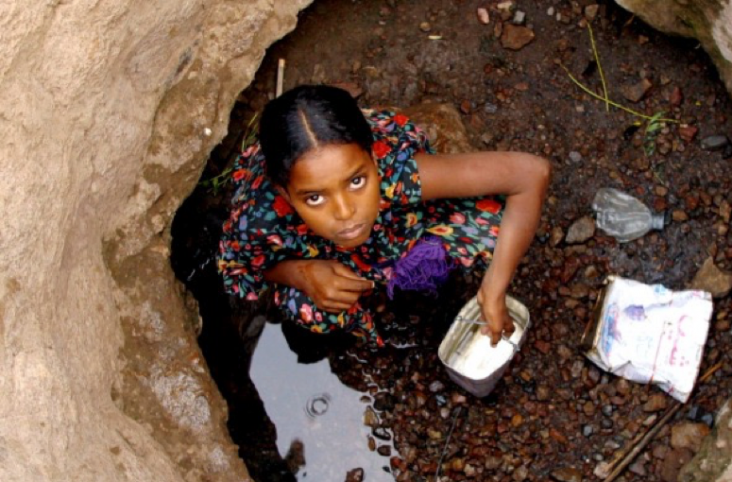Speeches Shim
In Djibouti, water is as precious as it is scarce. Since the country does not have a permanent source of surface water such as rivers or fresh water lakes, the country must rely on deep underground water tables, fed by rainwater infiltration, where they exist. Since 2009, Djibouti has been negatively affected by drought and its consequences on the rural and urban vulnerable communities. Precipitation levels have dropped to approximately half of the normal quantity, and underground water tables have been drawn down. The scarce rains allow a temporary regeneration of water aquifers, but are clearly insufficient to properly replenish these sources. The drought persists. Many cisterns and shallow wells dry up during the dry season, which lasts from April to September, increasing families’ difficulties to access this vital resource. Drought consequences are enormous. Many herders and rural dwellers have lost their sources of livelihood, and uncountable families have seen their incomes drastically reduced and, as a result, are forced to abandon their homelands and seek refuge in urban centers.
This displacement is accompanied by the disruption of traditional coping strategies and increased vulnerability. Preventable communicable diseases, such as cholera, measles and acute respiratory infections are becoming more frequent. More than 15 per cent of Djibouti’s population practices open defecation, and 78 per cent still lack access to improved toilets. There are significant discrepancies between urban and rural areas: while 70.4 per cent of urban inhabitants have access to sanitation facilities, only 16.4 per cent of the rural population has access to latrines.

USAID’s Water, Sanitation and Health (WASH) project aims to contribute to the reduction of mortality and morbidity of the most vulnerable children and women by increasing access to potable water, sanitation and hygiene and by raising awareness on key basic hygiene practices. The project, implemented by UNICEF, funded a strategy for the participatory management of water points in rural areas. The main strategic axes defined to ensure sustainable and affordable access to improved water are as follows (i) improved governance of water points through the transformation of Community Water Management Committees to Water User Associations to officially recognize their role and responsibilities, (ii) application of payment for water supply services to ensure the continuation of the provision of water, accompanied by specific measures to ensure affordability for the most vulnerable, and (iii) efficiency and proximity of operating and maintenance services to water users. The WASH project has provided training on project management for two international NGOs (Action Contre la Faim and Norwegian Refugee Council) and one local NGO, Association pour le Developpement Intégré de Mabla (ADIM). The latter was also trained on evidence-based planning for hygiene promotion within three communities in Tadjourah and Obock regions. Local actions for awareness raising on key hygiene practices were defined for each community taking into account the respective needs.
In addition to the key hygiene practices, treatment of diarrhea at household level and exclusive breastfeeding topics were also addressed to improve the overall knowledge of care providers at community level. Under USAID’s WASH project, sensitization materials were developed in Somali and Afar to support awareness-raising sessions at the community level. Existing materials used for Participatory Hygiene and Sanitation Transformation (PHAST) methods were updated with additional illustrations on water treatment as this topic emerges as a priority needs from the evidence-based planning for hygiene promotion. On improving access to potable water, USAID rehabilitated a total of 5 boreholes and 5 ring-wells in the Ali-Sabieh, Dikhil, Tadjourah and Obock regions, providing access to over 5,740 persons -- 2,040 of whom gained access to potable water sources for the first time.
Distribution pipes have been replaced and tanks serving as water towers were reinforced. The distribution network was expanded for one of the five water supply systems to cover the needs of additional persons. Furthermore, three existing systems have been rehabilitated and distribution networks expanded with the installation of solar pumping systems in the regions to allow distribution closer to the users and reduce the distance that women and girls need to walk to fetch water. Two other ring-wells in Ali-Sabieh have been rehabilitated for the benefit of populations living close to refugee camps. Priority was given to the rehabilitation of disrupted facilities serving communities with high-population density. USAID’s WASH activities have supported the installation of 40 household toilets covering an estimated 240 people in the Ali-Addeh region. 184 households with 736 persons have benefitted from the installation of shared improved toilets. Household members dug the pits and provided manual labor during the implementation. The operating and maintenance system of these toilets is ensured through an organization established by the beneficiaries themselves and monitored by the implementing partners.


Comment
Make a general inquiry or suggest an improvement.